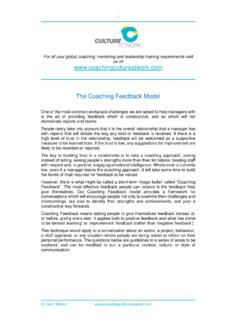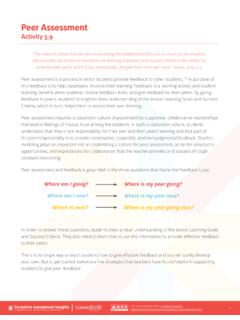Transcription of Enhancing Teaching Effectiveness and Student Learning …
1 The Journal of Effective Teaching an online journal devoted to Teaching excellence Enhancing Teaching Effectiveness and Student Learning Outcomes Allison Paolini1. Kean University, Union, New Jersey 07083. Abstract This manuscript addresses how post-secondary educators can enhance their Teaching ef- fectiveness and Student Learning outcomes through Student assessment. Highlights will include evidence-based practices, Teaching style, methodology, and the use of assessment data for university instructors. Primary focus will be data obtained from key stakeholders to improve Teaching practices to better meet the needs, expectations, and goals of their students, programs, and institutions, including consideration of implications for institu- tional program assessment on a broader scale.
2 Keywords: Assessment, feedback , data, Student outcomes, Teaching Effectiveness . Assessment of effective Teaching at all levels as a function of Student Learning outcomes has become a major focus of discussion across the Graduation rates among African- American, Hispanic, Native American, and low-income students are lower than other so- cio-ethnic groups in the (NCATE, 2010). Forty-five states are now implementing common core state standards to better align the K-12 curriculum across the country, and many areas are tying teacher evaluations to Student achievement.
3 Unlike K-12 education, higher education lacks uniform measures to assess the quality of classroom instruction. Some proponents of assessment advocate for common final exams in large multi-section introductory courses in departments at postsecondary institutions (Chingos, 2013). Since no universal college-level assessment measures exist, however, we must focus on aspects of instruction that positively correlate to Teaching Effectiveness , and use Student feedback and program benchmarks to assess that efficacy. Literature Review Teaching Excellence Effective instructors commonly pride themselves on having positive Student interactions in and out of the classroom, provide prompt feedback , and encourage teamwork amongst students (Hammer, Piascik, Medina, Pittenger, Rose, Creekmore, Soltis, Bouldin, Schwarz, & Scott, 2010).
4 The most impactful teachers also obtain and implement con- structive feedback , and use different techniques to encourage active Learning oriented to- wards students becoming self-directed, independent, and critical thinkers (Hammer et al., 1. Corresponding author's email: The Journal of Effective Teaching , Vol. 15, , 2015, 20-33.. 2015 All rights reserved. Enhancing Teaching Effectiveness and Student Learning Outcomes 21. 2010). Exceptional instructors are culturally sensitive, respectful, passionate, and charis- matic. They challenge students to work to their potential by setting high, yet reasonable expectations, emphasizing open communication, and asking higher-order thinking ques- tions that stimulate discussion.
5 Committed to their craft, they practice Teaching as an art that requires modification and mastery. Evaluating Teaching Excellence Three predominant sources for Teaching excellence assessment include students, col- leagues, and the teacher. Students complete evaluations at the end of the semester to pro- vide formative and summative feedback about the course and its outcomes. Colleagues provide constructive feedback for their peers by acknowledging strengths, as well as are- as for further improvement. Self-evaluation requires self-reflection and enables the in- structor to assess his or her growth over time in order to highlight and acknowledge im- provement (Hammer et al.)
6 , 2010). Best Practices According to researchers from Flinders University (2013), several aspects of Teaching in Australia warrant evaluation, including a myriad of best practices that educators can use to enhance Student - Learning outcomes. The primary evaluative aspect is assessing the quality of classroom Teaching . University instructors must be skilled, knowledgeable, in- formed, and prepared in order to create optimum Learning experiences (Flinders, 2013). The most effective teachers deliver concrete, explicit, and engaging instruction, imple- ment evidence-based classroom management and Teaching strategies, and build strong relationships with their students (Macsuga-Gage, Simonsen, & Briere, 2012).
7 Instructional Delivery. Teachers must prioritize the material they address to ensure that it meets the course's Learning objectives. Effective teachers focus on core topics and se- quence information to cover basic material before introducing new topics. Additionally, they organize activities in strands, presenting content through small segments of instruc- tion over several days, rather than planning one activity to address the entire concept. They assign students activities that promote understanding of skills and knowledge (Macsuga-Gage et al.)
8 , 2012). They focus on engaging students to build their communica- tion and social skills, learn how to work interdependently, and enhance their self- efficacy. Effective instructors use specific praise, reinforcements, and constructive feed - back to give students a holistic understanding of a topic. Utilize empirically supported classroom management practices. Mastery instructors engage in self-management and consultation, tracking their usage of classroom manage- ment skills and developing action plans to modify their practices based on data (Macsu- ga-Gage et al.
9 , 2012). Through consultation, instructors work with colleagues to collect and implement data to gauge Student strengths and weaknesses, and then use protocols to turn weaknesses into strengths. The most effective teachers monitor progress and assess how their changed practices have impacted Student outcomes (Macsuga-Gage et al., 2012). The Journal of Effective Teaching , Vol. 15, , 2015, 20-33.. 2015 All rights reserved. Paolini 22. Building positive relationships with students. To connect with students and impact their lives personally and professionally, teachers must be Student -centered and demon- strate respect for their background, ideologies, beliefs, and Learning styles.
10 The best in- structors use differentiated instruction, display cultural sensitivity, accentuate open com- munication, offer positive feedback on students' academic performance (Macsuga-Gage et al., 2012), and foster Student growth by allowing students to resubmit assignments pri- or to assigning a grade. Emphasizing quality over quantity. According to Weimer (2006), Teaching content and methods are inextricably linked and co-dependent; Teaching material impacts Student Learning more than the number of topics covered in class. Emphasizing quality helps stu- dents gain a mastery understanding of topics through engaging in discussion and activi- ties that help them grasp and retain materials (Weimer, 2006).














